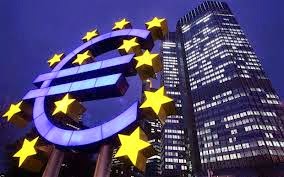Having well in mind the ugly times our country Greece is going
through since nearly half a decade , and looking into Europe's
future , it seems to me that the Old Continent's future doesn't
look bright at all...
*********** ********** **********
Here's how nobelist Paul Krugman analyzed the matter recently :
*******************
The United States and Europe have a lot in common .
Both are multicultural and democratic .
Both are immensely wealthy .
Both possess currencies with global reach .
Both unfortunately , experienced giant housing and credit bubbles between
2000 and 2007 , and suffered painful slumps
when the bubbles burst .
************ ********** ***********
Since then , however , policy on the two sides of the Atlantic
has diverged . In one great economy , officials have shown a stern
commitment to fiscal and monetary virtue , making strenuous efforts to balance
budgets while remaining vigilant against inflation . In the other , not so
much...
And the difference in attitudes is the main reason the two economies are
now in so different paths .
Spend-thrift , loose-money America is experiencing a solid recovery .
Meanwhile , virtuous Europe is sinking ever deeper into deflationary quicksand
.
Everyone hopes that the new monetary measures announced by the ECB will
break the downward spiral , but nobody I know expects them to be enough .
************* ************ **********
On the US economy : No , it's not morning in America , let alone the kind
of prosperity we managed during the Clinton years .
Recovery could and should have come much faster , and family incomes remain
well below their pre-crisis levels .
************* ************* ***********
Europe on the other hand , or more precisely the Eurozone , the 18
countries sharing a common - did almost everything wrong .
On the fiscal side , Europe never did much stimulus , and quickly turned to
austerity - spending cuts and , to a lesser extent , tax increases - despite
high unemployment .
On the monetary side , officials fought the imaginary menace of inflation ,
and took years to acknowledge that the real threat
is deflation .
Why they get it so wrong ?
To some extent , the turn towards austerity reflected institutional
weakness : In the US , federal programs like Social Security , Medicare and
food stamps helped support states like Florida with especially severe housing
busts , whereas European
nations in similar straits , like Spain , were on their own .
of the situation . In Europe as in America , the excesses that led to the
crisis overwhelmingly involved private rather than public debt , with GREECE
very much an outlier .
But officials in Berlin and Brussels chose to ignore the evidence in favour
of a narrative that placed all the blame on budget deficits , and simultaneously
rejected the evidence suggesting -
correctly - that trying to slash deficits in a depressed economy would
deepen the depression .
Meanwhile , Europe's central bankers decided to worry about inflation in
2011 and raise interest rates .
Even at the time it was obvious this was foolish - yes , there had been an
uptick in headline inflation , but measures of underlying inflation were too low
, not too high .
********** ********* **********
Monetary policy got much better after M.Draghi became president of the ECB
in late 2011 .
Indeed mr.Draghi's heroic efforts to provide liquidity to nations facing
speculative attacks almost saved the euro from collapse .
But it is not at all clear that he has the tools to fight off the broader
deflationary forces set in motion by years of wrongheaded policy .
Further more , he has to function with one hand tied behind his back ,
because GERMANY remains adamantly opposed to anything that MIGHT MAKE LIFE
EASIER FOR DEBTOR NATIONS .
The terrible thing is that Europe's economy was wrecked in the name of
responsibility .
True , there have been times when being tough meant reducing deficits and
resisting the temptation to print money .
In a depressed economy however , a balanced - budget fetish
and a hard - money obsession are deeply irresponsible .
Not only do they hurt the economy in the short run , they can - and in
Europe , have - inflict long - run harm , damaging the economy's potential and
driving it into a deflationary trap that's very hard to escape .
Nor was this an innocent mistake .
The thing that strikes me about Europe's archons of austerity , its doyens
of deflation , is their self - indulgence .
They felt comfortable , emotionally and politically , demanding sacrifice (
from other people ) at a time when the world needed more spending .
They were all too eager to ignore the evidence THAT THEY WERE WRONG .
And Europe will BE PAYING THE PRICE for their self - indulgence
for years , perhaps DECADES TO COME ......
÷÷÷÷÷÷÷÷÷ ********* ÷÷÷÷÷÷÷÷ ********* ÷÷÷÷÷÷÷÷
**************** *************
Well my friends , unfortunately the blogger has never been
more of the opinion , that all what Krugman sited , are so
accurate to the last detail !!!
÷÷÷÷÷÷÷÷÷÷÷÷÷÷÷÷÷÷÷÷÷÷÷÷÷÷÷÷÷÷÷÷÷÷÷÷÷÷÷÷÷÷÷÷÷÷÷÷÷÷



